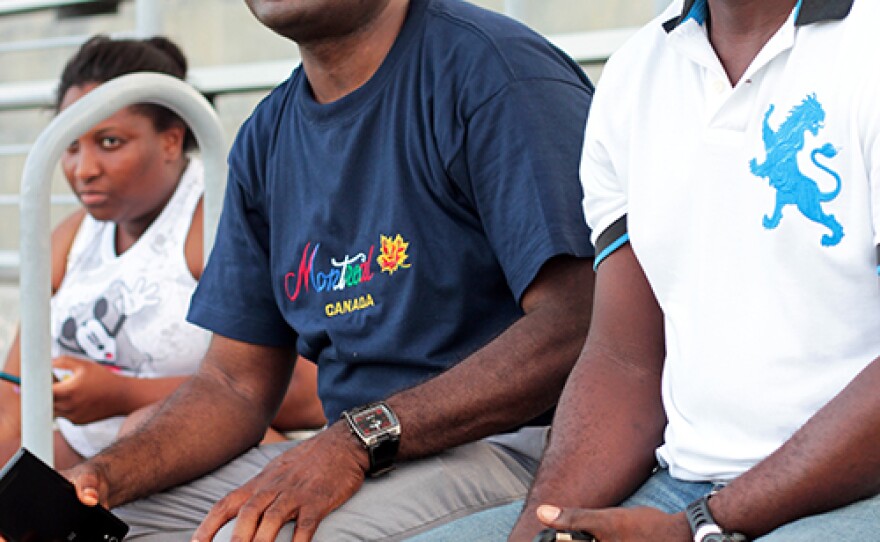On game days, the boys’ soccer team at Miami-Edison Senior High speaks Haitian Creole during huddles. Fans play Haitian carnival music, known as Rara, with drums and horns in the stands.
The school is smack-dab in the middle of Little Haiti, with a student body that, in many cases, is just beginning to master English. “When I took the program over,” says Gomez Laleau, who started coaching there in 2004, “99 percent of them were like Haitian-descent kids and college was not part of the discussion.”
“Why? Because that was not introduced to them,” Laleau adds, “or maybe they did not know what it is they needed to do as an athlete if they wanted to play at the college level.”
When I took the program over, college was not part of the discussion. —Coach Gomez Laleau
In his first year, Laleau rented a van and drove his team up to Georgia State University to give his players a taste of the possibilities. They slept in a single hotel room and took part in soccer tryouts the next day. A handful even made the team, with scholarship offers to match, he says, but none were ready to leave Miami. “You know, Coach, I cannot leave, because if I leave,and I’m the only one here with my mom, and she has nobody else,’” he recalls, paraphrasing his former students.
“And I’d say, ‘I understand that, but if you want to help your mom, that don’t have anything right now, she’s struggling, the best thing is to move away, get a degree'—and come back."

Eleven years later, Laleau is in the bleachers at Little Haiti Park, watching his fellow coaches run players through drills at Little Haiti FC, a soccer club he founded in 2014. This is where many of the Edison players stay in shape during the off-season.
“Work hard, work hard—don’t cheat yourselves!” urges coach Ernst Baptiste during a five-on-five scrimmage.
Both boys and girls from Edison are headed to play college soccer out of state. Eighteen-year-old WadelineSaintjuste says leaving Miami for Wisconsin is a difficult choice. “Sometimes, when I think about my mom, that I’m going to leave her,” Saint Juste says with a sigh. “Like she have other kids, but only me; I’m the first one in the family that going to college.
She’s going to Silver Lake college, a small Catholic liberal arts school in small-town Wisconsin, along with her classmate Tchepsen Noreus.
They leave in less than two weeks, but Tchepsen says it feels pretty remote from Port de Paix, where he lived until two years ago. “To be honest, when I was in Haiti, I never thought that I was going to have a scholarship to go to college for soccer, but when I came here, I’m like, I've got to play soccer, because that’s the only thing that can get me out of my life.”
All told, 14 Edison soccer players are heading to college on scholarships this year. That reflects the school’s talent and, players say, a stern focus on behavior and grades. In school, players report to the library for tutoring before soccer practice, and they have to carry around a weekly progress report to each of their classes. “Afterwards I got to return it back to Mr. Laleau,” Tchepsen says, adding that he gets A’s for behavior. On the academic side, he says sheepishly, “Sometimes it’s C, but it’s A and B.”
Edison has yet to send players to top-shelf soccer programs, but by focusing on small schools with more flexibility, Coach Laleau has carved out a niche for players who don’t have immigration papers, or whose English is still a work in progress.
On the field, the boys’ team has quietly become a local powerhouse. “The only program here that can actually handle Miami Edison is two programs in Dade County: Ransom Everglades and Gulliver,” Laleau boasts. “That’s it.”
You can just tell that they live, breathe soccer. They play so hard—sometimes too hard. —Bill Daley
In recent years, each of those teams—both at upscale private schools—has dealt Edison a painful loss before going on to win a state championship. Bill Daley, who covers high school sports for the Miami Herald, says competing with those schools is no small feat. “A lot of those kids come from these traveling teams and pretty much play year round,” Daley says.
Previewing a playoff game earlier this year, Daley wrote of Edison that they “pretty much play with a chip on their shoulder from the first whistle to the final whistle.”

“You can just tell that they live, breathe soccer,” Daley says. “They play so hard—sometimes too hard.”
Tchepsen Noreus took that as a compliment. “Yeah, we've got to play angry because we know where we came from,” he says. “We've got to work hard so we can be something in life.”








